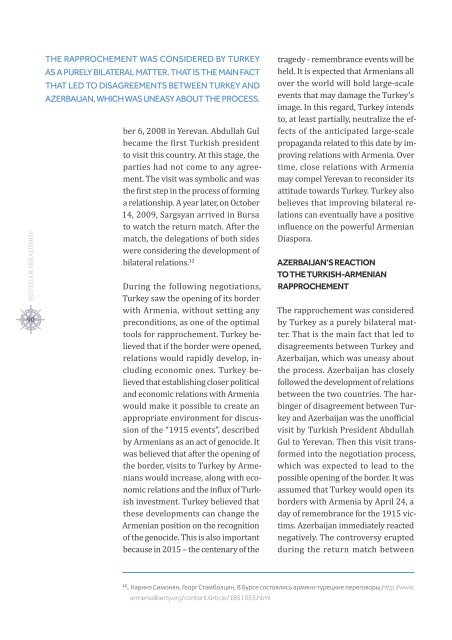Caspian Report - Issue 06 - Winter 2014
Create successful ePaper yourself
Turn your PDF publications into a flip-book with our unique Google optimized e-Paper software.
ROVSHAN IBRAHIMOV<br />
90<br />
THE RAPPROCHEMENT WAS CONSIDERED BY TURKEY<br />
AS A PURELY BILATERAL MATTER. THAT IS THE MAIN FACT<br />
THAT LED TO DISAGREEMENTS BETWEEN TURKEY AND<br />
AZERBAIJAN, WHICH WAS UNEASY ABOUT THE PROCESS.<br />
ber 6, 2008 in Yerevan. Abdullah Gul<br />
became the first Turkish president<br />
to visit this country. At this stage, the<br />
parties had not come to any agreement.<br />
The visit was symbolic and was<br />
the first step in the process of forming<br />
a relationship. A year later, on October<br />
14, 2009, Sargsyan arrived in Bursa<br />
to watch the return match. After the<br />
match, the delegations of both sides<br />
were considering the development of<br />
bilateral relations. 12<br />
During the following negotiations,<br />
Turkey saw the opening of its border<br />
with Armenia, without setting any<br />
preconditions, as one of the optimal<br />
tools for rapprochement. Turkey believed<br />
that if the border were opened,<br />
relations would rapidly develop, including<br />
economic ones. Turkey believed<br />
that establishing closer political<br />
and economic relations with Armenia<br />
would make it possible to create an<br />
appropriate environment for discussion<br />
of the “1915 events”, described<br />
by Armenians as an act of genocide. It<br />
was believed that after the opening of<br />
the border, visits to Turkey by Armenians<br />
would increase, along with economic<br />
relations and the influx of Turkish<br />
investment. Turkey believed that<br />
these developments can change the<br />
Armenian position on the recognition<br />
of the genocide. This is also important<br />
because in 2015 – the centenary of the<br />
tragedy - remembrance events will be<br />
held. It is expected that Armenians all<br />
over the world will hold large-scale<br />
events that may damage the Turkey’s<br />
image. In this regard, Turkey intends<br />
to, at least partially, neutralize the effects<br />
of the anticipated large-scale<br />
propaganda related to this date by improving<br />
relations with Armenia. Over<br />
time, close relations with Armenia<br />
may compel Yerevan to reconsider its<br />
attitude towards Turkey. Turkey also<br />
believes that improving bilateral relations<br />
can eventually have a positive<br />
influence on the powerful Armenian<br />
Diaspora.<br />
AZERBAIJAN’S REACTION<br />
TO THE TURKISH-ARMENIAN<br />
RAPPROCHEMENT<br />
The rapprochement was considered<br />
by Turkey as a purely bilateral matter.<br />
That is the main fact that led to<br />
disagreements between Turkey and<br />
Azerbaijan, which was uneasy about<br />
the process. Azerbaijan has closely<br />
followed the development of relations<br />
between the two countries. The harbinger<br />
of disagreement between Turkey<br />
and Azerbaijan was the unofficial<br />
visit by Turkish President Abdullah<br />
Gul to Yerevan. Then this visit transformed<br />
into the negotiation process,<br />
which was expected to lead to the<br />
possible opening of the border. It was<br />
assumed that Turkey would open its<br />
borders with Armenia by April 24, a<br />
day of remembrance for the 1915 victims.<br />
Azerbaijan immediately reacted<br />
negatively. The controversy erupted<br />
during the return match between<br />
12<br />
. Каринэ Симонян, Георг Стамболцян, В Бурсе состоялись армяно-турецкие переговоры,http://www.<br />
armenialiberty.org/content/article/1851953.html










